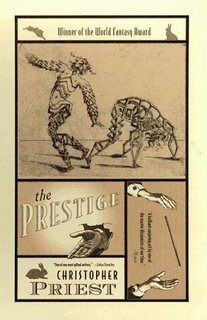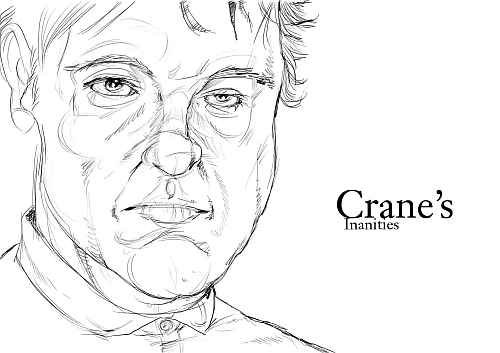 Anyway, I'm currently reading Christopher Priest's The Prestige, and I am enjoying the hell out of it. I can already see from the trailer for the film version a little of how the Nolan brothers deviated from the source material in their adaptation (for example, the magicians Angier and Borden were never friends in the novel). I'm just a few pages from what I think is the novel's major revelation. Priest's been building towards it for a while and I'm excited to get back to it and finish the damn thing. I'm even more eager to see the movie now. When I finish it, I'll say more about it.
Anyway, I'm currently reading Christopher Priest's The Prestige, and I am enjoying the hell out of it. I can already see from the trailer for the film version a little of how the Nolan brothers deviated from the source material in their adaptation (for example, the magicians Angier and Borden were never friends in the novel). I'm just a few pages from what I think is the novel's major revelation. Priest's been building towards it for a while and I'm excited to get back to it and finish the damn thing. I'm even more eager to see the movie now. When I finish it, I'll say more about it. I just finished reading the first of Patrick O'Brian's Jack Aubrey/Stephen Maturin novels, Master and Commander, and though I think quite a bit of the actual descriptions of sea battles and maneuvering went right the hell over my head (O'Brian is famous for depicting life at sea during the Napoleonic Wars with excruciating authenticity), what I was able to absorb I enjoyed immensely. I read the novel because I loved the film adaptation Peter Weir did a couple years back, and I wanted to see what O'Brian's legion of rabid fans have been so passionate about since 1970, the year Master and Commander was published.
I just finished reading the first of Patrick O'Brian's Jack Aubrey/Stephen Maturin novels, Master and Commander, and though I think quite a bit of the actual descriptions of sea battles and maneuvering went right the hell over my head (O'Brian is famous for depicting life at sea during the Napoleonic Wars with excruciating authenticity), what I was able to absorb I enjoyed immensely. I read the novel because I loved the film adaptation Peter Weir did a couple years back, and I wanted to see what O'Brian's legion of rabid fans have been so passionate about since 1970, the year Master and Commander was published.Well, first off, his legion of fans must know a hell of a lot more about sailing a sloop or a frigate or a snow or whatever sort of floating vessel various British sailors were steering around back in the first decade of the 1800's, because, seriously, without an annotated edition of Master and Commander, the purely nautical sections are nearly inpenetrable. There's quite a bit you can glean through context, but if a reader wants to know exactly what's happening during the the nautical scenes, as in for example when two ships are trying to get an advantage over the other in open water, you're more than likely out of luck. But no one will ever accuse O'Brian of writing down to his audience. He moves at a fast clip and if you don't keep up, he either figures you'll set the book aside and read something more your speed, or you'll catch up later.
But, even to a layperson unknowledgeable with regard to nautical terminology, the book has a lot to reccomend it. The characters of Jack Aubrey and Stephen Maturin are so finely drawn as to make me believe O'Brian lifted them from some obscure but exhaustive historical record of the time. Their relationship is the heart of twenty novels, (referred to as the Aubrey/Maturin Cycle), and the way their friendship begins is counterintuitive but kind of perfect -- by the end of the first page (they meet during a parlor concert of Locatelli's C major quartet), they detest one another. They get to be friends, of course, but in this first book they aren't yet quite the best buds they eventually get to be. I thought one of the more interesting aspects of their friendship was how they related with one another onboad Aubrey's ship, the Sophie. Captains are God onboard their ships (or in this case a sloop, a distinction O'Brian devotes quite a lot of ink to in the novel), and deferred to in all things, but Maturin, the ship's surgeon, is treated by both Aubrey and the men onboard with nearly the same level of regard. It's a little like reading the best history book about old-time naval warfare you'll ever read, only the private conversations so often left out are all included word for word. Just good stuff. Another thing I like about it is that we get to follow a character, Captain Jack Aubrey, whose fortunes are on the rise and who is, on occasion, very very happy about his life. He loves his job and his enthusiasm is infectious. I like a good depressing literary novel as much as the next guy, and not to say all literary fiction is necessarily down in the mouth, but it is nice to read some literature that's not so preoccupied with angst and dissatisfaction.
And I watched the film again over the past couple days. Still excellent and I'd say it's moved up into my top ten films of all time. Weir got it exactly right in every regard.

No comments:
Post a Comment